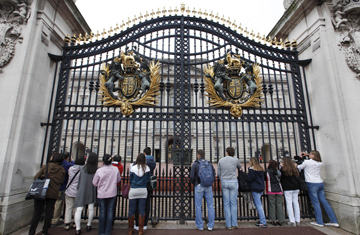
Tourists peer through the railings of Buckingham Palace in central London, October 5, 2010. The United States and Britain warned their citizens on Sunday of an increased risk of terrorist attacks in Europe
Given the thickening flurry of terror-related developments around the world — intelligence discoveries, counter-terrorism efforts, rising threat levels — the global public, and people in Europe in particular, could be forgiven for reading them as worrying signs of a looming strike on Western soil. Yet despite the feeling that all this activity is reaching a critical mass, European security officials stress that they have no reason to believe an attack is imminent. And they note that while the general terror threat is indeed relatively high, it is not acute.
"When reliable information about terror planning or intent comes to you — especially from different regions at once — the significance and multiplicity of that forces you to consider the overall atmosphere and threat of attack higher than before," says a European counter-terrorism official who requested neither his name nor nationality be revealed. "But when that information isn't specific enough to indicate the nature, timing, venues, or people likely to be involved in the contemplated attacks, then you can't view a strike as imminent — despite the generally higher level of alert. That's where we are in Europe today."
The reasons for this collective caution are as disparate as the counter-terrorism actions being taken in the hopes of easing it. Getting the most attention is the threat emanating from the Afghan-Pakistani border area, which U.S. drones continued to pound this week with the aim of disrupting or atomizing radicals thought to be orchestrating a series of attacks for export to Europe. U.S. intelligence agencies learned of the plot after the July arrest of German national Ahmed Sidiqi in Afghanistan. During interrogation, Sidiqi revealed that he'd been told by extremist leaders allied with al-Qaeda that commando groups were planning to mount attacks against soft targets in several European countries, notably France, Germany, and England. Though indications suggested the preparations hadn't gotten beyond the formative stages, U.S. officials decided to proceed with an unprecedented number of drone attacks in Pakistani tribal zones, where organizers of the plot and their operatives were thought to be hunkered down.
The result: One British national suspected of having been tasked with leading a newly mounted group to carry out terror attacks in the U.K. was killed during a September drone strike. This week, media reports said four German nationals were killed by drones in North Waziristan, where they were believed to have been plotting terror attacks with al-Qaeda leaders. Though all of this seemed to confirm Sidiqi's revelation that al-Qaeda leaders had very clear intentions of unrolling attacks in Europe, any actual plans to do so don't seem to have advanced very far — a point that unnamed intelligence sources from various countries have stressed to the media.
Still, on Oct. 3, the U.S. issued a mild travel warning for its citizens headed to Europe, while the U.K. raised its estimated terror threat for France and Germany — but left its own domestic alert level at "severe." Late on Oct. 5, Paris reciprocated by issuing a U.K. security warning to French voyagers.
On Wednesday, German Interior Minister Thomas de Maiziere suggested that everyone around Europe should remain realistic about the terror risk — but without going overboard. "No one should doubt that Germany is a target for terrorists, but on the other hand there are no concrete, immediate attack plans that we are aware of," he told Deutschlandfunk German radio. "Public discussion is something terrorists use because they want to spread fear."
But sometimes police action appears to contradict the message to keep calm. In France, 12 people were arrested in a series of raids Oct. 5 — including three people suspected of providing false identity papers and safe housing for Europeans traveling to and from the Afghan-Pakistani region to receive training from and fight with the Taliban. Though the network involved had been under surveillance for some time, the operation was ordered after the Oct. 2 arrest of a 28-year-old French man of Algerian origin in the Naples train station, where he was found to be carrying a bomb-making "kit". Tuesday's sweeps were prompted by the discovery of the names and numbers of the three main suspects on his cell phone.
Jean-Louis Bruguière, formerly France's top anti-terrorism official, says all European nations are paying close attention to movement and planning in the Pakistan border area, because "since 2008, as Islamist networks in Europe have re-focused full attention on the Afghan jihad, we've all seen an increasing flow of Europeans traveling to the region for combat and terror training." Despite that, Bruguière repeats the view of French security officials that the most immediate threat for France is North Africa's al-Qaeda in Islamic Maghreb. "It has proven its stated strike out at France by kidnapping French citizens in Africa," he says, "which means we're taking its promises to unleash violence on French soil more seriously than ever."
